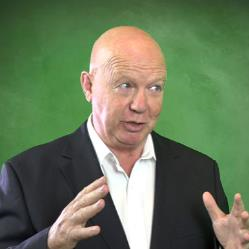 "A high performing sales culture will generate sustainable growth" - Interview by John Smibert
"A high performing sales culture will generate sustainable growth" - Interview by John Smibert
Many organisations are striving to achieve a high performance sales culture in order to achieve sustainable growth. Yet what is a high performance sales culture and what makes it high performing?
 I asked sales leadership guru Maria Nordstrom this question. She provided some enlightening insight into what it means.
I asked sales leadership guru Maria Nordstrom this question. She provided some enlightening insight into what it means.
Firstly she pointed out that there is not one single style of high performing cultures - one highly performing culture can be quite different to another.
She explained that "the culture in itself may be very inclusive, it may have some very specific metrics and measurements that drives that culture, but the key thing is the leadership. Depending on the type of leadership you have, you will actually describe that culture".
Maria went on to explain what makes up a high performance culture and what sort of things influence the way it develops.
View or read this interview to get to learn more. This is likely to be valuable reading for CEO's, CSO's and Sales leaders. I will conduct a series of interviews with Maria to explore this subject in more depth so stay tuned..
************
Maria Nordstrom, Managing Director of The Upside Group, is an executive coach, a specialist in sales leadership and a change leader focused on high performance sales cultures.
Interview
John: Hello, I'm delighted to have Maria Nordstrom with me - welcome, Maria!
Maria: Thank you, John - delighted to be here!
John: Maria is a specialist in sales leadership and in high-performing sales teams or high-performing cultures, so I'm really looking forward to a series of discussions with you, Maria!
Maria: Likewise!
John: Talking about high-performance cultures, explain a high-performance culture from your point of view.
Maria: It's an interesting question actually because high-performing cultures means different things to different people in different organisations, so there's not one definition. There are some key attributes that basically I use to describe a high-performing culture or a high-performing sales culture, but it is defined to what you would like and the outcomes that you're looking for in your organisation.
John: So one high-performing culture can look quite different to another high-performing culture.
Maria: Absolutely.
John: But both high-performing.
Maria: Both high performing, yes. So the culture's maybe slightly different, depending on what culture you have within the business already and what you drive within that business to generate outcomes. So the culture in itself may be very inclusive, it may have some very specific metrics and measurements that drives that culture, but the key thing is the leadership. Depending on the type of leadership you have, you will actually describe that culture slightly differently.
 John: So the leadership actually put their stamp on that culture.
John: So the leadership actually put their stamp on that culture.
Maria: Absolutely.
John: The culture doesn't exist, unless the leaders lead the people into a culture of some sort.
Maria: Exactly, yes.
John: Okay. So what does a leader need to do to create that culture, or should that be a discussion we have another time?
Maria: Well, we can start, if you like, to describe it. One of the key things obviously is to understand the strategy and the customers that you're serving first of all. If you understand the customers and the market that you're serve and the strategy you're creating, then you can start creating internally in organisations the support to support that market or to work to support that market. It is very key that the people understand what it is that you're trying to achieve, so you're trying to define not only the jobs but also what they're there to do on a day-to-day basis and how they effect a strategy on a day-to-day basis and how they actually effect the outcomes of the customer, and they're obviously very key elements within that.
John: You make it sound easy. [laughs]
Maria: Yes. [laughs] The thing is that it's not that easy, and that is because there's not necessarily that easy to be consistent and to continue a journey without disruptions. Because as soon as you have a disruption and you start behaving inconsistently to what you're actually describing you want your culture to be, you tend to go backwards.
John: Yes. People revert very quickly to what they're familiar with, don't they?
Maria: Absolutely, yes.
John: A culture change, the word "culture" really means an embedded way of doing things, an embedded way of communicating and being around the people that you're with and so on and so forth, and to embed it takes a lot of effort, a lot of time, a lot of leadership.

Maria: Absolutely. Not only do you need to have a very clear strategy, you need to understand how the people fit into that strategy. You need to be very clear on how you communicate, not only as a group or from the leadership out to the business but also between the people and between the groups of people within the business, how you do problem solving, how you ensure that you're more collaborative rather than actually handing over issues, so you work together to solve problems and issues and actually work in a more collegic way if you like to work to achieve the outcomes of the business.
John: But as you said, when people are under pressure or they hit a disruption in the business, they tend to revert. How do you avoid that happening?
Maria: I think the leadership need to be very conscious of the language that's being used. And the other thing is when you're setting expectations, when you're setting up to start on this journey, that there are certain things that you may or may not be able to do. If you're a subsidiary of, like I worked for an organisation that was a subsidiary of a Japanese company for instance, there were certain things that we could do in Australia, there were certain things that we were affected by a head office. So when you're starting a journey, if you're a subsidiary, if you're a business that's reliant on other partners or a head office, that you actually set out the journey to be the local journey and within that the framework that you can affect and that you can actually manage or lead.
John: And you've used the word "journey" a lot. It is a journey, it's not "Hey, we're going to change our culture and in three months' time we're going to be different."
 Maria: Absolutely. And I think the key is that if you do that upfront, you're setting the parameters as you embark on this journey, and basically you say, "Well, these are the things that we can affect and work with locally and that's what we're going to focus on." If you're trying to set it out as a much bigger picture and you're actually telling yourself that you can do more than you actually can do, then you're setting out on a lie from day one and it's very hard then to get consistency.
Maria: Absolutely. And I think the key is that if you do that upfront, you're setting the parameters as you embark on this journey, and basically you say, "Well, these are the things that we can affect and work with locally and that's what we're going to focus on." If you're trying to set it out as a much bigger picture and you're actually telling yourself that you can do more than you actually can do, then you're setting out on a lie from day one and it's very hard then to get consistency.
John: And people won't believe it, will they?
Maria: And people won't believe it, exactly, or as soon as you break that consistency or you do something that is not necessarily in line with how you set out to do it or the actual plan, people will then not believe you and then you go backwards.
John: And the authentic leadership is an absolute key to that, isn't it? Look, that's a great message for the leaders out there, and I'd like to come back and talk to you a lot more on subjects related to how we change the sales culture.
Maria: Absolutely, John - it would be my pleasure!
John: Thank you very much, Maria!
Maria: Thank you!
****************
You can access Maria Nordstrom at The Upside Group
****************

Your Invitation: I invite you to join the Sales Leader Forum group on LinkedIn where you can experience informative discussions with your peers and sales thought leaders on subjects like the one we have discussed here. I also invite you to subscribe to the
- Sales Leader Resource Centre here
- Sales Leader YouTube channel here (300+ sales leadership videos)
Please Share: If you valued this article, please share via your Twitter, LinkedIn, Google+ and Facebook social media platforms. I encourage you to join the conversation or ask questions. So feel free to add a comment on this post - I promise to respond. If inclined please follow my LinkedIn post page here.
Want to touch base? If you have questions please feel free to contact me - email: john.smibert(at)salesleaderforums.com, Phone: +61 404857893 or Skype: john.smibert